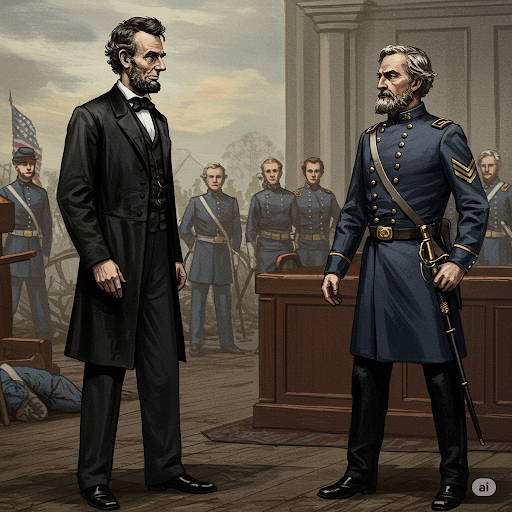Abraham Lincoln Vs Jefferson Davis: A Comprehensive Analysis
Leadership Styles During the American Civil War
The leadership approaches of Abraham Lincoln and Jefferson Davis during the American Civil War represent one of history’s great contrasts in executive management during crisis. Their differing backgrounds, personalities, and governance philosophies profoundly shaped the trajectory of the conflict between the Union and Confederacy.
Abraham Lincoln’s Pragmatic Leadership
Abraham Lincoln demonstrated remarkable adaptability despite his lack of military experience. His leadership was characterized by:
Constitutional Flexibility:
- Expanded presidential powers significantly during wartime
- Increased the Regular Army without congressional approval
- Allocated funds without prior authorization
- Suspended habeas corpus to maintain order in border states
- Prioritized preservation of the Union over strict constitutional interpretation
Strategic Political Management:
- Maintained public support despite controversial decisions
- Demonstrated remarkable political instincts when managing generals
- Removed ineffective commanders regardless of popularity
- Effectively utilized the Joint Committee on the Conduct of War
- Made decisive personnel changes without suffering political damage
Compelling Communication:
- Articulated war objectives in accessible language
- Connected military necessity to moral purpose
- Delivered powerful speeches that resonated across social classes
- Successfully framed the conflict in terms of national preservation
- Used public addresses to sustain morale during difficult periods
The Emancipation Question:
- Evolved his position on slavery throughout the conflict
- Initially prioritized Union preservation over abolition
- Crafted the Emancipation Proclamation with strategic boundaries
- Struggled with personal views on racial coexistence
- Advocated colonization as a potential solution to racial tensions
Jefferson Davis’s Administrative Approach
Jefferson Davis brought extensive military and political experience to his presidency, yet faced significant challenges:
Leadership Limitations:
- Failed to connect emotionally with the Confederate populace
- Never achieved Lincoln’s level of popular appeal
- Struggled to inspire widespread enthusiasm for the Confederate cause
- Could not effectively dramatize the Southern struggle
- Failed to frame secession with the ideological power of the American Revolution
Administrative Qualities:
- Maintained personal integrity and high ethical standards
- Demonstrated moral courage by supporting unpopular positions
- Possessed exceptional public speaking abilities focused on logic
- Brought substantial governmental experience to his role
- Displayed unwavering dedication to Southern independence
Military Management Weaknesses:
- Retained incompetent officers despite public criticism
- Developed destructive relationships with key generals like Joseph Johnston
- Over-involved himself in military planning
- Created friction with capable commanders like P.G.T. Beauregard
- Mismanaged key personnel decisions in critical departments
Strategic Vision Deficiencies:
- Failed to establish clear national objectives beyond independence
- Never articulated a compelling moral justification for the Confederacy
- Could not translate military victories into strategic advantages
- Struggled to balance state sovereignty with national necessity
- Did not effectively mobilize Confederate resources for total war
Leadership Impact on Military Operations
The divergent leadership approaches of Lincoln and Davis had direct consequences on battlefield outcomes:
Lincoln’s Military Leadership:
- Gradually developed effective working relationships with generals
- Learned military strategy through persistent self-education
- Demonstrated willingness to experiment with different commanders
- Maintained strategic focus on critical objectives
- Balanced political considerations with military necessity
Davis’s Military Involvement:
- Micromanaged military operations despite capable field commanders
- Allowed personal relationships to influence strategic decisions
- Failed to establish unified command structure until too late
- Struggled to coordinate resources between theaters
- Could not effectively mediate disputes between competing generals
Public Perception and Historical Legacy
The historical reputations of both leaders reveal fascinating contradictions:
Lincoln’s Paradoxical Image:
- Known as “Honest Abe” despite constitutional liberties
- Remembered as an emancipator despite complex racial views
- Revered for preserving democracy through sometimes undemocratic means
- Celebrated for moral leadership while pursuing pragmatic policies
- Transformed from controversial wartime president to national icon
Davis’s Reputation Challenges:
- Never achieved Lincoln’s level of contemporary popularity
- Failed to establish enduring personal connection with citizens
- Remembered more for failures than successes
- Associated with Confederate defeat despite personal competence
- Overshadowed by military leaders in Confederate historical memory
Governance Philosophy and Constitutional Views
The fundamental differences in governance philosophy between Lincoln and Davis reflected deeper constitutional interpretations:
Lincoln’s Constitutional Approach:
- Viewed the Constitution as a living document requiring adaptation
- Prioritized national survival over strict constitutional constraints
- Expanded federal authority to meet wartime challenges
- Recognized that extraordinary times demanded extraordinary measures
- Created precedents for expanded executive power in crisis
Davis’s Constitutional Vision:
- Adhered to strict constructionist interpretation
- Emphasized states’ rights even when impractical
- Struggled to balance Confederate ideology with wartime necessities
- Maintained principled positions at expense of pragmatic solutions
- Failed to develop new constitutional framework suitable for revolution
Conclusion: Leadership Lessons
The contrasting leadership styles of Lincoln and Davis offer enduring lessons:
- Successful crisis leadership requires balancing principle with pragmatism
- Effective communication creates emotional connection with constituents
- Personnel decisions have strategic consequences beyond immediate impacts
- Leadership adaptability often matters more than experience
- Constitutional interpretation must evolve to meet extraordinary challenges
The American Civil War’s outcome was determined by many factors, but the profound differences in presidential leadership between Abraham Lincoln and Jefferson Davis undoubtedly shaped the conflict’s course and ultimate resolution. While Lincoln’s willingness to adapt and evolve allowed the Union to effectively mobilize its superior resources, Davis’s more rigid approach limited the Confederacy’s ability to maximize its initial advantages and sustain its revolution.
